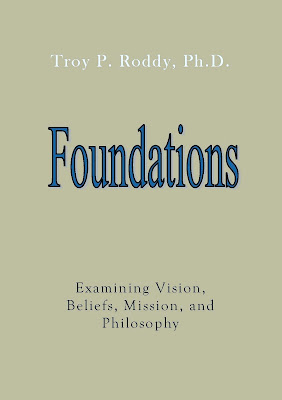Professional Learning Opportunity: An Invitation To Explore Your Foundations
M y experiences with professional learning opportunities have taught me a few things. The more personal the experience, the better. Recyclable experiences (those that can be used multiple times) present deeper opportunities. Expensive does NOT equal value. The easier it is to share the "lesson", the better chance of the experience being transformative. This is why I have really come to appreciate reading short eBooks and reflecting on their content. Generally, these eBooks can be read in one sitting, prompt you to reflect on the message, and make it simple to return to the source multiple times as needed. Oh by the way, they are also inexpensive and easy to recommend and share. As recently announced, my new eBook, Foundations: Examining Vision, Beliefs, Mission, and Philosophy , is now available for Kindle on Amazon.com. Every effective leader makes decisions and takes action based upon a set of foundations. In Foundations: Examining Vision, Beliefs, Missi










